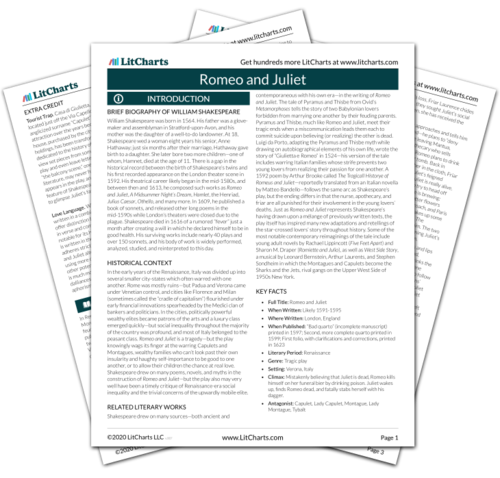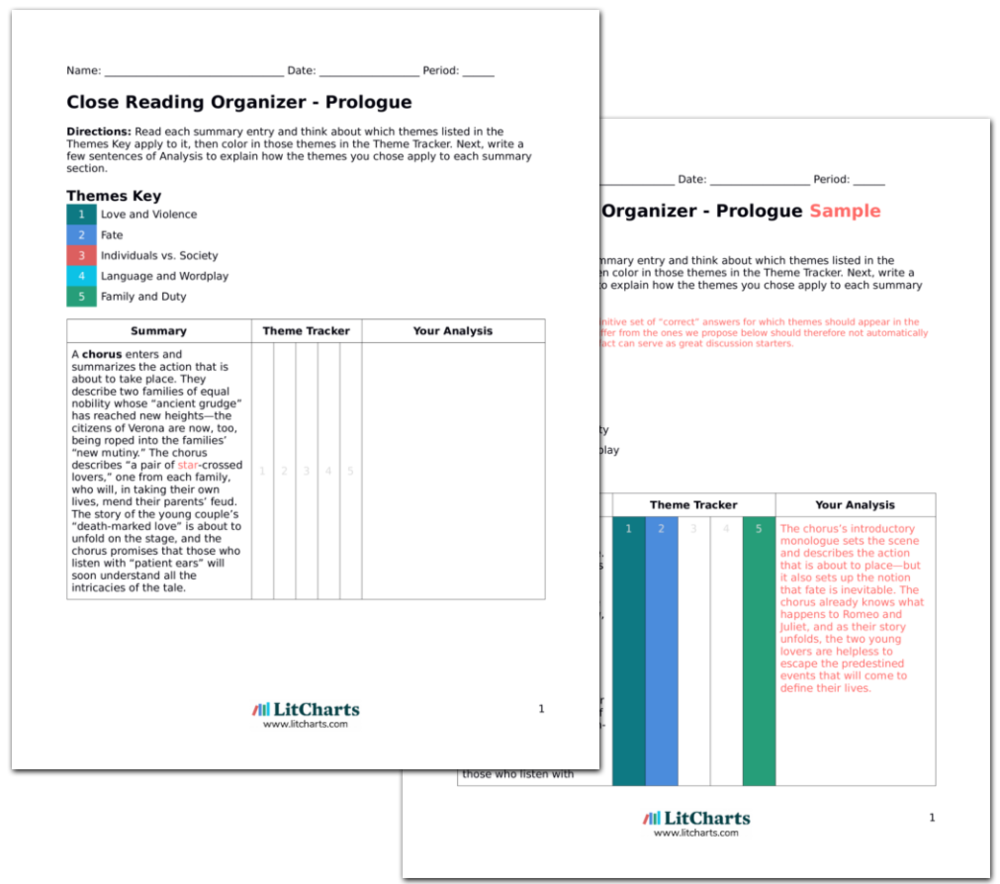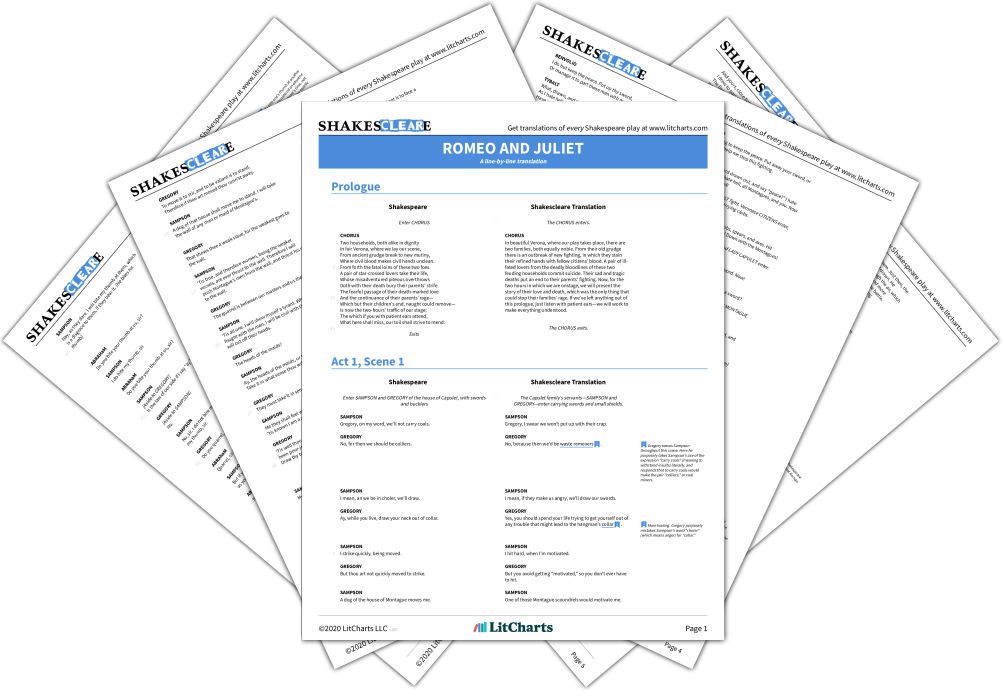![]()
LitCharts assigns a color and icon to each theme in Romeo and Juliet, which you can use to track the themes throughout the work.
![]()
![]()
![]()
![]()
![]()
Juliet , in her chambers, begs night to fall so that Romeo can at last “leap” into her arms and perform the “amorous rites” of love. Juliet is excited to sleep with Romeo so that they can both cast off their “stainless maidenhoods.” She wants Romeo—her “ day in night ”—to come to her on the “wings of night.” She predicts that when she “die[s],” the constellations will cut Romeo’s face into stars, arrange themselves in his image, and cause the whole world to fall in love with night while scorning the “ garish sun .” The day has grown terribly tedious as she waits, like an “impatient child,” to wear her “new robes” and possess the “mansion of a love” she has recently bought.
Juliet’s speech in this scene shows her desperately looking forward to consummating her marriage to Romeo and thus losing her virginity. The language she uses, however, as she attempts to express her feelings is inherently violent—she invokes the Elizabethan use of the phrase “die,” a euphemism for orgasm. She also talks about cutting Romeo up, and scorns the traditionally welcoming light of the sun in favor of anticipating the dark, fathomless night.
Active Themes![]()
![]()
The nurse enters with Romeo ’s rope ladder, and Juliet asks if she brings any news. The nurse calls out mournfully, “He’s dead, he’s dead,” and Juliet of course believes she is speaking of Romeo. When Juliet asks if Romeo has died, the nurse will not answer, and continues talking about the bloody corpse she has just seen lying in the street. Juliet believes that Romeo is dead—but the nurse calls out that it is Tybalt who has died, while Romeo is banished for Tybalt’s murder. Juliet, horrified that Romeo would kill one of her kinsmen, laments angrily “that deceit should dwell in such a gorgeous palace.” The nurse agrees with her and states that all men are wicked liars, then wishes aloud for great shame to come to Romeo. Juliet instantly chides her nurse for speaking ill of Romeo.
Juliet seems almost relieved to realize that it is Tybalt, not Romeo, who has died in the street. Her alliances have begun to shift—she feels closer to Romeo than a family member she’s known her entire life. Even though Juliet harbors some anger toward Romeo, as soon as her nurse speaks out against him, Juliet retaliates angrily.
Active Themes![]()
![]()
The nurse points out that Romeo did kill Juliet ’s cousin. Juliet wrestles with the emotional and moral conundrum before her— Tybalt , she says, would have killed Romeo had Romeo not killed him first. She admits she is happy that Romeo is alive, but quickly grows anxious as she realizes that being banished from Verona is as good as being dead. Juliet asks where her parents are, and her nurse tells her they are crying over Tybalt’s body. Juliet says she refuses to cry for Tybalt—her tears must only be for Romeo, who has condemned her to “die maiden-widowèd.” The nurse, seeing Juliet’s pain, says she’ll go out to find Romeo and bring him back to Juliet so that she may be comforted. Juliet begs her nurse to make haste.
As Juliet reckons with the fact that her great love has killed one of her kinsmen, she’s forced to consider her alliances and decide where her loyalty lies. Juliet has been raised to believe that her only allegiance must be to her family and her house—but now that she has fallen in love with and married her enemy, Romeo is technically her family, as well. Juliet is undergoing an intellectual and moral shift which will inform her decisions throughout the rest of the play.
Active Themes![]()
![]()
 on Romeo and Juliet" />
on Romeo and Juliet" />
“Would not have made it through AP Literature without the printable PDFs. They're like having in-class notes for every discussion!”
Get the Teacher Edition on Romeo and Juliet" />
on Romeo and Juliet" />
“This is absolutely THE best teacher resource I have ever purchased. My students love how organized the handouts are and enjoy tracking the themes as a class.”
Romeo and Juliet in Plain English
“Every teacher of literature should use these translations. They completely demystify Shakespeare. Students love them!”
Copyright © 2024 All Rights Reserved Save time. Stress less.AI Tools for on-demand study help and teaching prep.
 Quote explanations, with page numbers, for over 44,020 quotes.
Quote explanations, with page numbers, for over 44,020 quotes. PDF downloads of all 1,990 LitCharts guides.
PDF downloads of all 1,990 LitCharts guides. Expert analysis to take your reading to the next level.
Expert analysis to take your reading to the next level. Advanced search to help you find exactly what you're looking for.
Advanced search to help you find exactly what you're looking for.
 Expert analysis to take your reading to the next level.
Expert analysis to take your reading to the next level. Advanced search to help you find exactly what you're looking for.
Advanced search to help you find exactly what you're looking for.